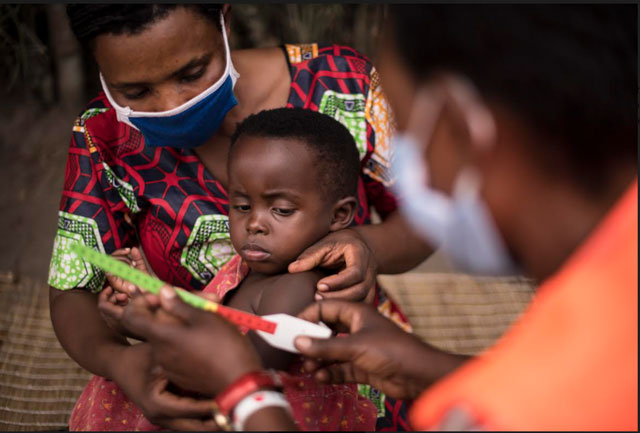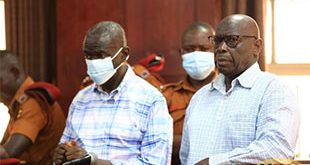
Nearly three out of every ten children in West Nile are stunted
Arua, Uganda | THE INDEPENDENT | The Office of the Prime Minister has launched NutriCash – a project that will see children under two years, pregnant and breastfeeding mothers in West Nile region, Northwestern Uganda, receive sh48,000 ($14 ) every month to help meet their nutrition needs. NutriCash is part of the Child Sensitive Social Protection Programme funded by Sweden.
The United Nations World Food Programme (WFP) and United Nations Children’s Fund will implement NutriCash in collaboration with OPM, Ministry of Gender, Labour and Social Development, Ministry of Health and Ministry of Local Government. NutriCash also falls under the OPM-led Development Response to Displacement Impact Programme through which districts that host large numbers of refugees receive support to ease pressure on resources and social services.
Adam Kahsai-Rudebeck, Deputy Head of Cooperation at the Embassy of Sweden in Kampala, described NutriCash as a long time investment in protecting women and children, and a show of solidarity with the most vulnerable during a time when they need it the most.
“COVID-19 affected us all but the poor and vulnerable are hardest hit. Many people have been denied their basic right to food and we cannot just look on. For many years, Sweden has stood in solidarity with the people of Uganda through our development cooperation. We are especially proud to fund NutriCash because it is a unique project that has the potential to strengthen social protection and change attitudes and behaviour for better nutrition for both refugee and host communities in West Nile.”
The project builds on earlier COVID-19 emergency cash support that Sweden provided to over 120,000 households in West Nile to enable the most vulnerable families survive the pandemic.
“Children, pregnant and breastfeeding women have special nutrition needs. When resources are limited, they are most affected by malnutrition. We must prioritise the needs of women and children to ensure there is a strong foundation for generations to come,” Abdirahman Meygag, WFP Representative to Uganda, said.
“WFP is honoured to work with the government of Uganda to ensure that we attain our goal of zero hunger. We are committed to collaborating with government to implement this holistic project that goes beyond giving cash assistance to financial literacy training, addressing root causes of malnutrition and putting in place more inclusive nutrition policies.”
West Nile, where NutriCash will be implemented across eight districts, is home to half the 1.5 million refugees in Uganda. Rapid population growth, combined with the COVID-19 pandemic, are stretching the already limited resources for both refugees and host communities.
Nearly three out of every ten children in West Nile are stunted. Additionally, half of all children and more than a quarter of women are anaemic, according to the 2021 Food and Nutrition Assessment. Malnutrition could irreversibly damage children’s health, ability to learn and future earning capacity. Nearly half the deaths among children under five are due to malnutrition. While malnutrition could affect anyone, children, pregnant and breastfeeding women are particularly vulnerable as they have special dietary needs.
Besides, in patriarchal societies such as Uganda, they often fall at the bottom of the soceital hierarchy – affecting what and when they eat and limiting access to resources that they could use to help improve their nutrition. The NutriCash project targets these vulnerable groups while strengthening government social protection and health systems to ensure that, even in the face of shocks, their nutrition is not compromised.
Beyond giving money, NutriCash will also involve intensive campaigns to enable families take on habits that improve their lifestyle, health and nutrition.
“UNICEF recognizes the multifaceted nature of malnutrition. It is important that we not just treat women and children, but also give them information on what food to eat, while ensuring that local markets can meet these dietary needs. Ending malnutrition will require all stakeholders from the top down—not only women and children who suffer malnutrition, but also market vendors, for instance,” Dr M. Munir A. Safieldin, UNICEF Representative to Uganda, said. “NutriCash is an example of a sustainable and inclusive solution to malnutrition, and it will go a long way in changing the lives of women and children in West Nile.”
While Government of Uganda and partners have invested a lot in social protection and nutrition, the projects mostly concentrate on giving immediate nutrition support. Nutricash will go further to strengthen government’s social protection and integrate nutrition into national health systems. Government is already reviewing social protection policies to ensure that they include nutrition as a key aspect.
“Nutrition-specific approaches alone are not enough to address the complex causes of malnutrition. Government values this strategic partnership with Sweden, WFP and UNICEF because it is not just treating malnutrition but also strengthening government systems,” said Hillary Onek, the Minister of Relief, Disaster Preparedness and Refugees. “As government, we are committed to transforming our social protection and addressing nutrition through the right policies and approaches that work for everyone.”
 The Independent Uganda: You get the Truth we Pay the Price
The Independent Uganda: You get the Truth we Pay the Price


